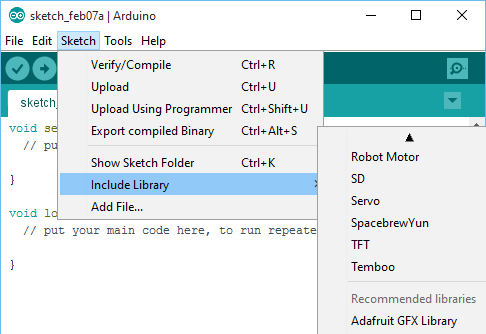Feb 13, 2018 The pre-built ESP-IDF libraries are embedded into the Arduino library build (in Tools/SDK/lib) and linked. The headers come with the Espressif-IDF install. In the above code I point to my location.
Close the Arduino IDE
First make sure that all instances of the Arduino IDE are closed. The IDE only scans for libraries at startup. It will not see your new library as long as any instance of the IDE is open!
It will not see your new library as long as any instance of the IDE is open!Download the Zip FileMake sure to select a released version of the library. Some library repositories are still in development, and may contain unreleased or untested code. The 'Releases' button takes you to the tested and released versions.
|
Find it in the Downloads FolderOSX will automatically open the zip file there. |
Drag it to your Libraries FolderOpen your sketchbook Libraries folder and drag the master folder from Downloads into it. |
Give it a Legal NameThe IDE will not recognize folders with dashes in the name. So you must rename the Github Master Folder. Underscores are OK! |
Re-start the IDERestart the Arduino IDE and verify that the library appears in the File->Examples menu.Load one of the library examples to test. |
Verify that it CompilesClick the check-mark icon in the upper left and verify that the example sketch compiles without errors. |


The Library Manager is the simplest and safest way to install libraries. If possible, that is the method you should use.
If the library you want to use is not available via the library manager, you can get the source code and place it into your machine's local library folder. The location of the folder is rather specific.
See the file hierarchy below:
It is important to install your libraries in the correct location. Otherwise the compiler will not be able to locate them when you try to compile and upload your sketches.
Locate your Sketchbook Folder and the Libraries Folder Inside
Your sketchbook folder is the folder where the Arduino IDE stores your sketches. This folder is automatically created by the IDE when you install it.
On Linux machines, the folder is named 'Sketchbook' and it is typically located in /home/
On Windows and Macintosh machines, the default name of the folder is 'Arduino' and is located in your Documents folder.
Arduino Library Locations Macon Ga
User installed libraries should go in a folder named Libraries, located inside your sketchbook folder. This is where the IDE will look for user installed libraries.
Arduino Library Download
Arduino Library Locations Machine
Open the Preferences DialogClick File -> Preferences in the IDE. |
Find the Sketchbook LocationUsually a folder named Arduino in your Documents folder. |
Create a Libraries FolderIf there is no Libraries folder there, create one. |
Rename to LibrariesRight click on the New Folder and select Rename. Then type in Libraries. |